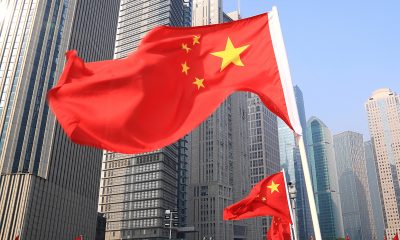World
Out in the World: LGBTQ news from Europe and Asia
More than 180,000 people attended the annual Taiwan Pride parade on Oct. 28

Taiwan
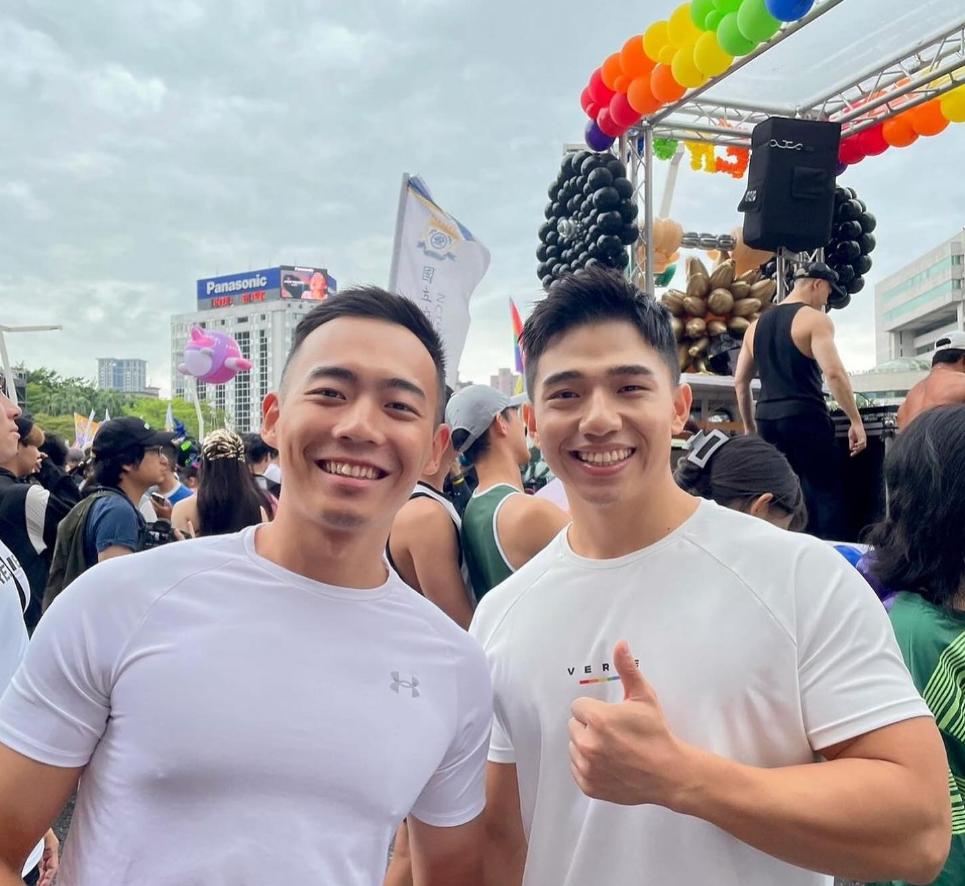
The 21st annual Pride parade through the streets of the capital city this year marked a major milestone as over 180,000 people marched on Oct. 28 for Asia’s largest Pride parade.
Mixed in with drag queens and go-go dancers, Vice President Lai Ching-te became the highest-ranking official to join the throngs of people celebrating the occasion on the streets of downtown Taipei.
The theme of this year’s pride parade was “Stand with Diversity,” came months after adoption rights were extended to same-sex couples in the country and the recognition of Taiwanese same-sex spouses who were married in foreign countries.
Lai, the country’s vice president and a leading presidential candidate, who is running as the progressive party’s candidate in the Jan. 13, 2024, elections noted that Taiwan is at the forefront of LGBTQ rights in Asia in his remarks to reporters and Pride attendees.
“Love knows no boundaries; LGBTQ+ rights are human rights. Today, we celebrate love, courage and justice at the 21st Taiwan Pride parade. As the first Asian country to legalize same-sex marriage, we stand with diversity and remain committed to building a more inclusive society for all,” he told the crowd adding: “I want to explain to all my good friends that marriage equality is not the end but the starting point of Taiwan’s equal rights culture. In the future, I will stand with everyone and move forward together on the road of diversity. I will stand with all of you, firmly supporting you in being true to yourselves, [and] making Taiwan even more beautiful.”
China
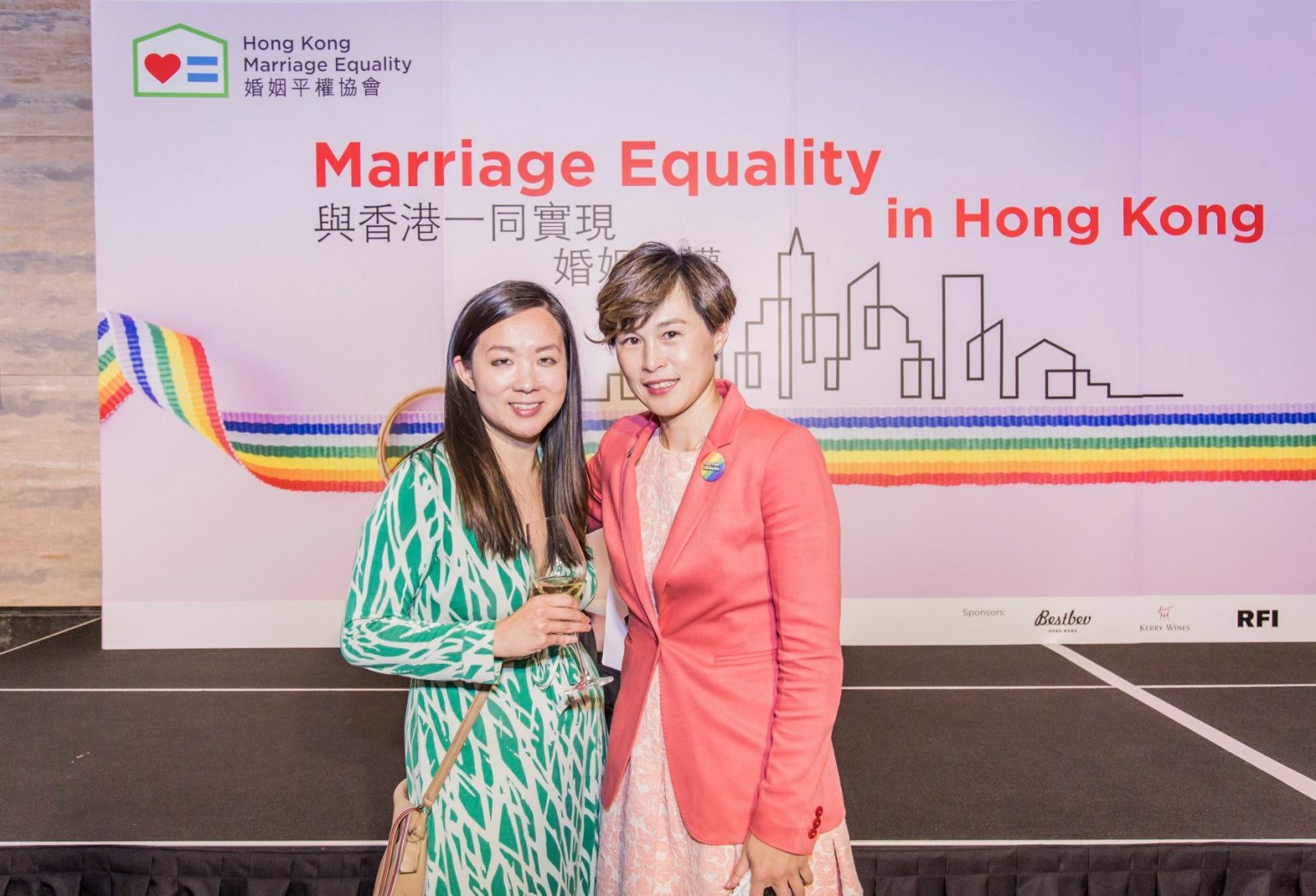
A ruling by Hong Kong’s Court of Appeal on Oct. 17 is being called a partial victory for LGBTQ rights in Hong Kong. The High Court dismissed a government legal attempt to deny same-sex married couples the right to rent and own public housing saying that it was “discriminatory in nature” and a complete denial of their rights.
Court of Appeal Justices Jeremy Poon, Aarif Barma and Thomas Au said in their ruling that the authority’s treatment of gay married couples was “discriminatory in nature” and they should be afforded equal treatment.
“The differential treatment in the present cases is a more severe form of indirect discrimination than most cases because the criterion is one which same-sex couples can never meet,” the judges wrote.
LGBTQ rights group Hong Kong Marriage Equality released a statement saying that the decision had made clear “that discrimination and unequal treatment on the ground of sexual orientation has no place in public policy decisions.”
In September, same-sex couples won a partial victory in the Court of Final Appeal, Hong Kong’s highest court, when it ruled that the government must formulate an alternative framework for same-sex couples seeking legal recognition as the court refused to recognize same-sex marriages which are not currently allowed.
Australia
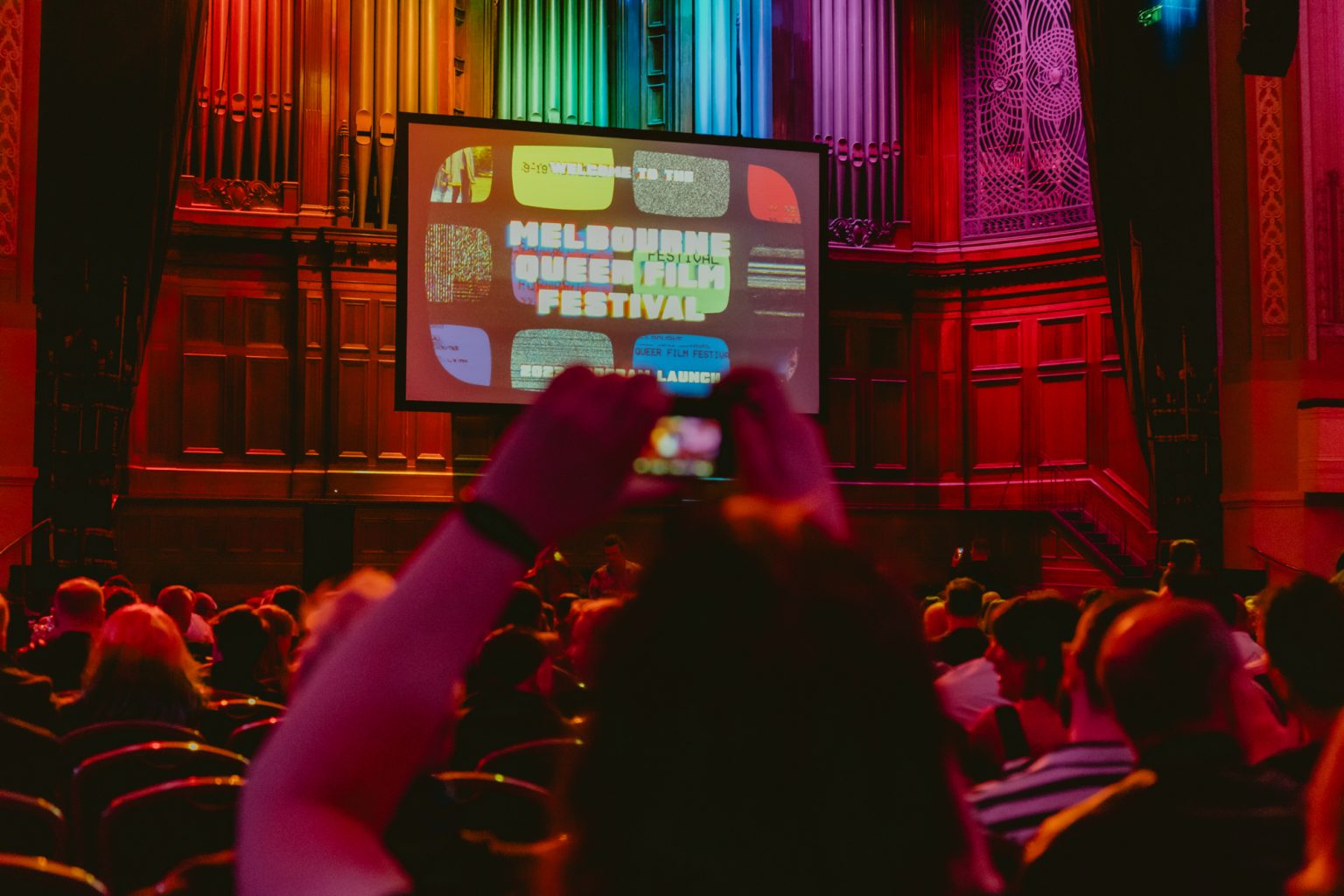
The 33rd annual Melbourne Queer film festival, the largest and oldest queer film festival in the country will take place from Nov. 9-19 with the festival’s theme of “rewind to fast forward.”
David Martin Harris, the festival’s CEO, speaking with Australia’s largest LGBTQ media outlet, the Star Observer, noted, “This year’s fabulous program will bring the community together to celebrate queer film, our diverse stories, and voices,” said Harris. “There are so many stories from across the globe that share important messages, whether that be heart-warming, uplifting, hilarious, or inspirational — the program will connect audiences for a celebration like no other.”
According to the Star Observer, staying true to its theme Rewind to Fast Forward, this year the festival celebrates queer classics including “La Cage Aux Folles,” “Glen or Glenda,” “Head On” and “Offside,” alongside a vibrant tapestry of fresh stories from around the world.
In an interview with the Guardian, Cerise Howard, the curator of the film festival, regarding the overarching theme said “We [LGBTQ people] have always been here so it’s vital we engage with our history.”
The language in some of the festival’s historic films “may be considered problematic today,” Howard told the Guardian, pointing to terms like “sex change operation” rather than gender affirmation surgery in 1953 drama “Glen or Glenda.” “But it’s important we are able to collectively not just enjoy but be educated by films of yesteryear.”
“We need to see our community in all its diversity, but we don’t need to see us all painted as saints — because we’re not,” she added. “We are complex, nuanced human beings capable of good and bad.
“We’d be doing audiences a disservice if we tried to paint a utopian vision of our lives — because no one could relate to that anyway. So the stories shouldn’t aim to be universal but particular — because in that particularity I think people can see themselves and engage more.”
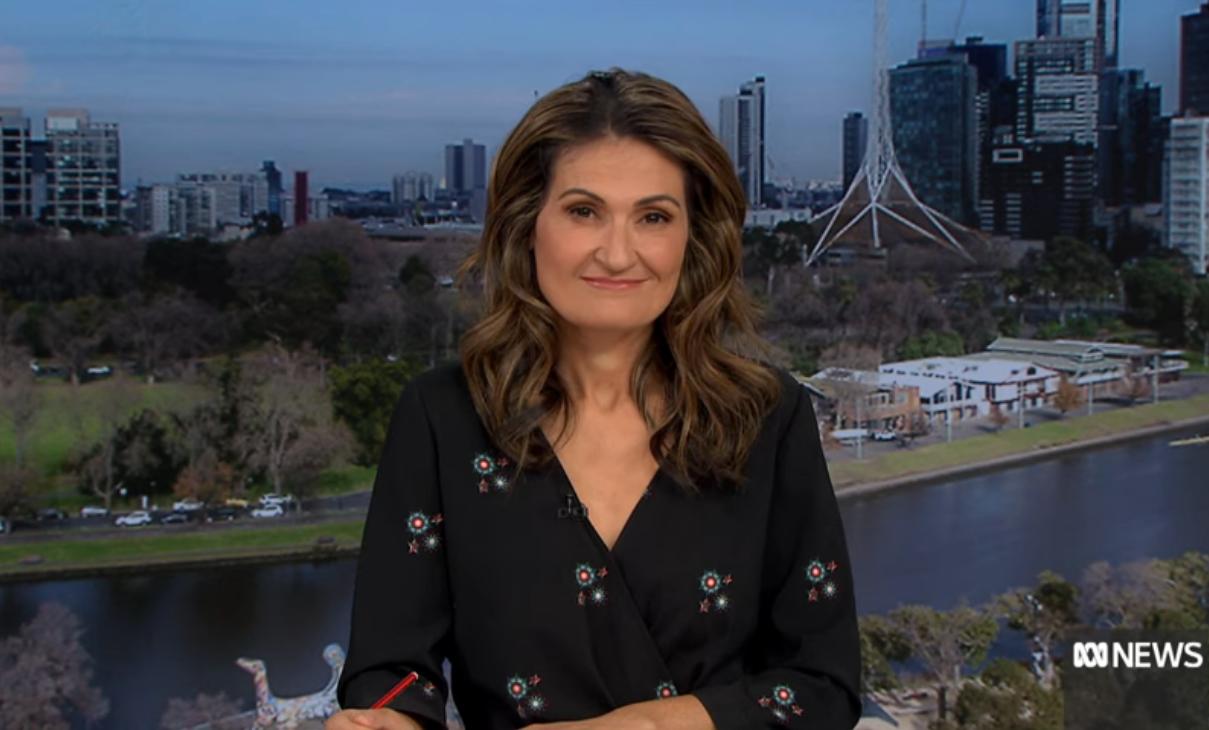
Nationally prominent Australian Broadcasting Corporation’s journalist Patricia Karvelas recently has been the target of right wing homophobic and racist trolls for talking openly about her life as a now out proud lesbian and her wife and family.
In an interview with the network’s ABC Queer program, Karvelas said that she had to keep her sexuality a secret at the start of her career, especially from anti-LGBTQ politicians. Karvelas said that she was “paranoid” about being outed and did not want to lose out on opportunities because of her sexuality.
After she shared her personal story with the network’s ABC Queer, British right-wing tabloid publication Daily Mail reported on her interview, which then triggered online trolls that viciously targeted the award-winning journalist with vile homophobic abuse.
In an X, formerly Twitter, post, the veteran journalist responded with “Daily Mail writes story. Trolls target me for hours with vile stuff. My family is really proud of me thanks.”
ABC’s Director of News Justin Stevens released a statement on behalf the network defending her and taking aiming at the British tabloid publication without naming it noting “publicizing it and publishing personal photos to illustrate it is irresponsible and unjustified.”
“ABC journalist and presenter Patricia Karvelas is a fine, principled journalist and a courageous and generous human being,” the statement read adding:
“We’re proud she works for the ABC and grateful for her hard work and huge contribution to the national public broadcaster and audiences.
It is disturbing, saddening and angering that Patricia should find herself the target of online trolling and abuse, much of it sexualized, homophobic and racist, just for speaking publicly about her life.
For a major national media outlet to compound that abuse by publicizing it and publishing personal photos to illustrate it is irresponsible and unjustified.
As the eSafety Commissioner says: journalists are more likely to experience online abuse who are female, from diverse racial or social backgrounds, are younger, have a disability, or identify as LGBTIQ+. It can have devastating professional and personal impacts. It can lead to the silencing of journalists, with some self-censoring, retreating from covering certain topics or leaving the industry.
Media outlets should be combatting dangerous online abuse and gender-based and sexual bullying, and standing in solidarity with peers experiencing it, not disingenuously serving to amplify it.”
United Kingdom
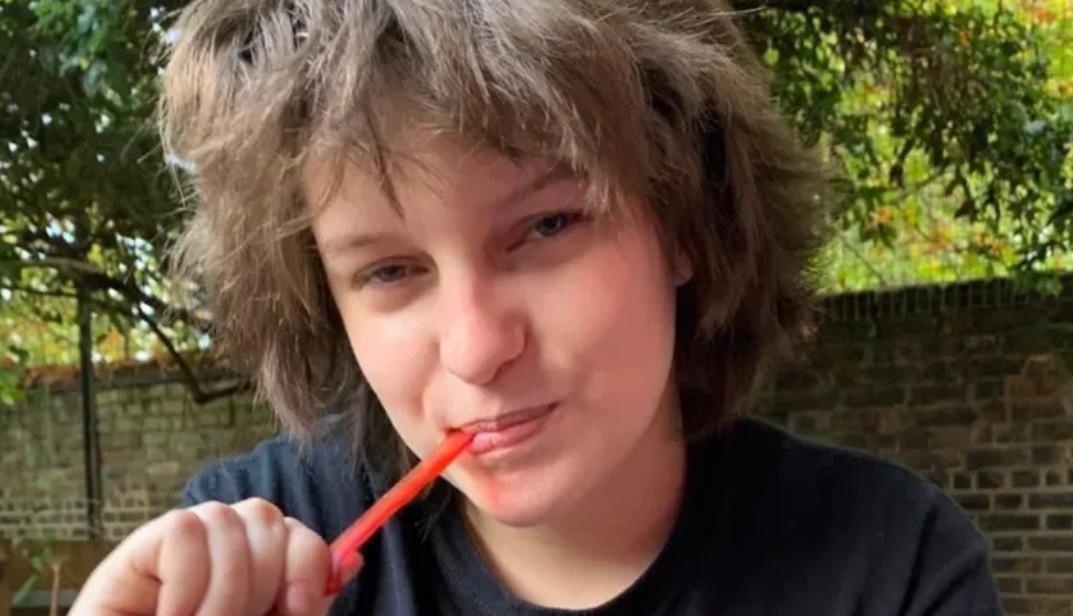
The death of a 14-year-old trans boy by suicide on Oct. 12 created a need by his mother Rita Williams, to set up a GoFundMe fundraiser to cover her son’s funeral expenses. The family indicated that after the costs of a memorial headstone, grave plot, flowers and other associated funeral expenses were raised any remainder was to be donated to charities and the hospital that treated him.
On Nov. 3, Williams thanked contributors for raising £10,493 ($13001.19) raised of the £6,000 ($7434.21) goal. She had written that “after Corei has been laid to rest and the memorial paid for, we will give everything remaining to charity: 50 percent to Great Ormond Street Hospital as they looked after Corei and us so well in his last days, and 50 percent split equally three ways between the trans youth charities Think2Speak and Mermaids, and the youth mental health charity Young Minds, in the hope that young lives can be saved.”
In an X, formerly Twitter, post, Williams also shared a picture of a letter she received regarding her son’s organs. In the letter, it details that one of his kidneys and pancreas was provided to a lady in her 40s who had been on the organ donation waiting list for seven years, while the other kidney was given to a young girl who had been waiting for two years.
“As you may be aware, kidney disease is a very debilitating condition. It requires sufferers to have a special diet and for some dialysis in hospital, sometimes up to four times a week,” the letter reads.
“Corei has given this lady and young girl the chance of a life free from dialysis they were dependent on.”
The letter goes on to state that a teenage girl also received a lifesaving liver transplant because of the young man and now has the chance of a “healthier and brighter future.”
Finally, the “very precious and especially rare gift of a double lung transplant” was given to a man in his fifties.
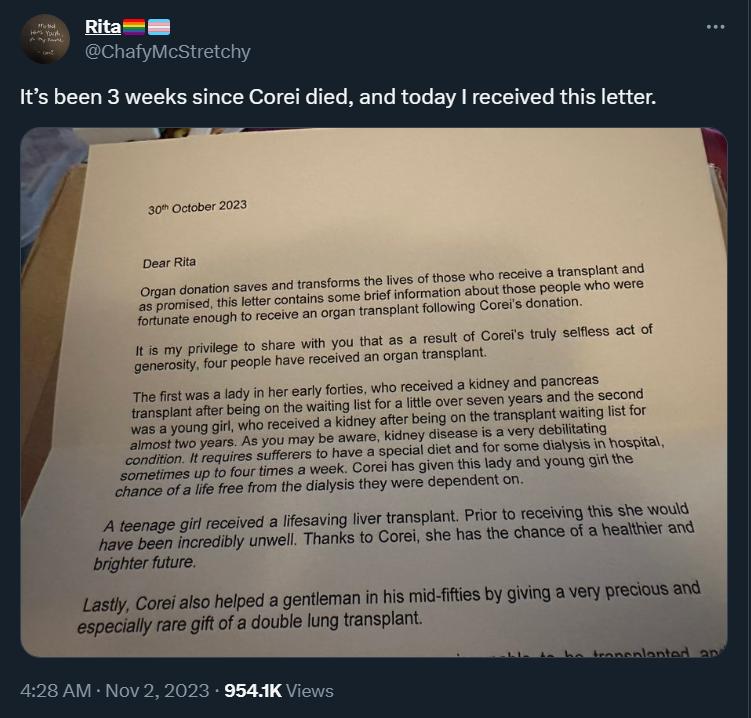
In the GoFundMe post, Williams wrote of her son:
“Corei was a typical teenager who loved giraffes, doctor who and the color yellow. He loved all sorts of animals and adored his friends. He was open and accepting of everybody. He had wicked sense of humor and was full of sass, and he was also stubborn and a pain in the arse! He was so passionate about everything, whether that be bugs, sewing or his mates.
He was autistic and struggled with his mental health. Unfortunately he was also subjected to transphobic abuse. […] I’d like to share some words that he wrote in his last letter. Please take them to heart and act on them in his name.
Thank you all. You changed my life for the better, but it wasn’t enough. Everybody who was there however, is the reason I was able to last this long. I beg of you all, don’t miss me. I will hopefully be seen as a boy in my next life, so I’m happy, do not miss me.
You are all precious humans who deserve to be loved, cherished and have all your dreams come true. To anybody who misgendered/deadnamed me; I forgive you, I only hope this teaches you to think more carefully about your actions.
Protect trans youth, in my name. Take this as an opportunity; be thankful for your family and friends because they are still here, though I may not be.
I am a person filled with grudges and anger but I choose to let them all go. I will be happy as a boy with god so no need to worry about me. Thanks again to those people. – Corei”
Hungary
In a statement posted to his personal social media accounts on Monday, L Simon László, the director general of the Hungarian National Museum, announced that he was fired by Hungarian Cultural Minister János Csák for allowing the presentation of five photographs that portray elderly queer Filipinos caring for each other in a group home they’ve shared for decades at the prestigious World Press Photo exhibition.
The cultural minister said that public display of the photographs violated 2021 law that restricts minors under age 18’s access to content that depicts LGBTQ people, culture or history.
In his statement László wrote: “Minister János Csák informed me this morning that he terminated me from the position of director general of the Hungarian National Museum because in his opinion I sabotaged the Child Protection Act. I accept the decision, but I cannot accept it. The museum deliberately did not violate any legislation by presenting the pictures of the World Press Photo exhibition.
The ministry itself acknowledged this in its previous letter: ‘In my opinion, no circumstance suggesting intentional violation of the law on the part of the Hungarian National Museum … ‘ Contrary to what was stated in the ministry’s announcement, we followed the [Csák] instruction without delay and without delay, we introduced the under 18 years restriction and immediately notified the sustainer.
As a father and grandparent of four children, I strongly refuse that our children should be protected from me or the institution I manage.”
Reuters reported the museum stopped selling tickets for the photo exhibition for youngsters after the far-right Our Homeland party had initiated a government inquiry, the party said.
“Based on the initiative of Mi Hazank (Our Homeland), youngsters under 18 cannot visit the exhibition at the National Museum as it violates the child protection law,” the far-right party told state news agency MTI. The new rule was posted on the museum’s website.
European Union
European Parliament resolution backs ‘full recognition of trans women as women’
Non-binding document outlines UN Commission on the Status of Women priorities

The European Parliament on Feb. 12 adopted a transgender-inclusive resolution ahead of next month’s U.N. Commission on the Status of Women meeting.
The resolution, which details the European Union’s priorities ahead of the meeting, specifically calls for “the full recognition of trans women as women.”
“Their inclusion is essential for the effectiveness of any gender-equality and anti-violence policies; call for recognition of and equal access for trans women to protection and support services,” reads the resolution that Erin in the Morning details.
The resolution, which is non-binding, passed by a 340-141 vote margin. Sixty-eight MPs abstained.
The commission will meet in New York from March 10-21.
A sweeping executive order that President Donald Trump signed shortly after he took office for a second time on Jan. 20, 2025, said the federal government’s “official policy” is “there are only two genders, male and female.” The Trump-Vance administration has withdrawn the U.S. from the U.N. LGBTI Core Group, a group of U.N. member states that have pledged to support LGBTQ and intersex rights, and dozens of other U.N. entities.
India
Trans students not included in new India University Grants Commission equity rules
Supreme Court on Jan. 29 delayed implementation

The University Grants Commission is a regulatory body under India’s Education Ministry that is responsible for coordinating and maintaining standards in higher education. The University Grants Commission Equity Regulations, 2026, aim to address discrimination and promote the inclusion of lower castes, tribes, people with disabilities, those who are economically disadvantaged, and other marginalized groups in higher education.
The regulations quickly triggered controversy.
Students, faculty and civil society groups criticized them, largely around concerns about potential discrimination against students and the absence of certain procedural safeguards. Yet, even as the debate intensified, there was little public discussion about the lack of explicit mention of transgender students in the framework. The omission, though not central to the overall controversy, raised questions among some advocates about the scope of the regulations and who they ultimately protect.
According to the All India Survey on Higher Education, trans student enrollment in universities and colleges rose from 302 in the 2020-2021 academic year to 1,448 in the 2022-2023 academic year, reflecting a sharp increase but still representing a very small share of India’s overall higher education population.
The Supreme Court in its 2024 National Legal Services Authority v. Union of India affirmed trans people are entitled to full constitutional protection, including equality, dignity and access to education, and directed governments to treat them as a socially and educationally disadvantaged group eligible for quota-based protections in education and public employment. The ruling recognized gender identity as integral to personal autonomy and held that discrimination on this ground violates fundamental rights under Articles 14, 15, 16, and 21.
Against this legal backdrop, the regulations do not explicitly reference trans students, an omission that has drawn attention in discussions on how constitutional protections are implemented within higher education institutions.
In the Indian constitutional framework, Articles 14, 15, 16, and 21 collectively form the foundation of equality and personal liberty.
Article 14 guarantees equality before the law and equal protection of laws; Article 15 prohibits discrimination on grounds such as religion, race, caste, sex or place of birth; Article 16 ensures equality of opportunity in public employment; and Article 21 protects the right to life and personal liberty, which courts have interpreted to include dignity, autonomy, and access to education. These provisions underpin judicial recognition of protections for marginalized communities, including trans people, within public institutions.
Judicial and policy frameworks in India have increasingly recognized the need for institutional support for trans students, underscoring the contrast with the absence of explicit mention in the University Grants Commission Equity Regulations, 2026, regulations.
The Madras High Court has directed educational institutions to implement measures such as gender-neutral restrooms, mechanisms to update name and gender in official records, inclusion of trans identities in application forms and the appointment of LGBTQ-inclusive counselors for grievance redressal alongside enforcement of the Transgender Persons (Protection of Rights) Act and its Rules.
Policy instruments have echoed similar priorities.
The National Youth Policy 2014 acknowledged trans youth as a group facing social stigma and called for targeted interventions, while the National Education Policy 2020 emphasized reducing dropout rates and ensuring equitable access to education. The University Grants Commission itself has previously indicated that universities should adopt affirmative steps and institution-specific plans to support trans people, making their absence from the current regulatory text more pronounced.
Research and policy analyses have consistently documented structural barriers faced by trans students in India’s education system. The Center for Development Policy and Practices and other academic studies note that discrimination, bullying, and the absence of gender-sensitive infrastructure contribute to high dropout risks among trans students in both school and higher education. Census data underscore this disparity.
The 2011 Census recorded a literacy rate of about 56.1 percent among trans people, significantly lower than the national average of roughly 74 percent, reflecting long-standing barriers to access and retention in formal education.
The controversy intensified after the Supreme Court on Jan. 29 stayed the implementation of the University Grants Commission Equity Regulations, 2026, and agreed to examine their constitutional validity.
A bench led by Chief Justice Surya Kant observed the regulations raised serious legal questions, including concerns that some provisions appeared vague and potentially open to misuse, and sought responses from the federal government and the University Grants Commission. The court directed that the earlier 2012 anti-discrimination framework would remain in force in the interim and listed the matter for further hearing, signalling the need for detailed judicial scrutiny.
Public and political reactions followed, with student groups, academics, and political actors divided over the stay and the broader policy direction. The federal government, led by Prime Minister Narendra Modi, maintained the regulations were intended to address caste-based discrimination and strengthen accountability within higher education institutions even as debate intensified nationally.
The regulations go beyond paperwork. They require universities to create on-campus equity monitoring teams and designated officers responsible for identifying incidents of discrimination, receiving complaints and reporting them to institutional committees for action. However, while the framework spells out protections for certain caste and social categories, it does not explicitly include trans students within this structure. In practice, that absence could leave uncertainty about whether routine monitoring, reporting and grievance mechanisms would extend to them with the same clarity, particularly in campuses where implementation already varies widely.
The regulations also prescribe penalties for faculty and staff found responsible for discrimination, including suspension, withholding of promotions, or termination of service following institutional inquiry. For students, disciplinary action may range from warnings to suspension depending on the severity of the misconduct. Where an incident amounts to a violation of existing statutory or criminal law, institutions are required to refer the matter to law enforcement authorities, placing responsibility on universities to escalate cases beyond internal mechanisms when warranted.
The regulations do not create new criminal offences but require institutions to escalate cases to law enforcement when conduct violates existing statutes. These may include the Scheduled Castes and Scheduled Tribes (Prevention of Atrocities) Act, relevant provisions of the country’s penal code, such as criminal intimidation, assault or sexual harassment, disability rights protections, workplace harassment laws, and statutes addressing campus hazing. The framework is therefore stringent: campus inquiries can lead to disciplinary action, and, where legal thresholds are met, mandatory reporting to police. In the absence of explicit mention of trans students within the framework, questions remain about how individuals from the community would navigate complaint systems, interact with authorities, and access consistent institutional protections under these processes.
The Scheduled Castes and Scheduled Tribes (Prevention of Atrocities) Act, 1989 is among India’s strictest anti-discrimination criminal laws and applies to students, staff and any individual accused of caste-based offences. It criminalizes acts such as intentional insults or humiliation, social exclusion, threats, physical assault and other forms of harassment directed at members of specific castes or tribes. Offenses under the law can lead to arrest, non-bailable charges in several categories, and imprisonment that may extend from months to years depending on the severity of the conduct, along with fines. The law also restricts anticipatory bail in many cases and mandates prompt registration of complaints, which is why it is often viewed as a powerful legal safeguard for marginalized communities while also being regarded by some as carrying serious legal consequences once invoked.
Nishikant Dubey, a member of India’s ruling Bharatiya Jana Party, welcomed the Supreme Court’s decision to stay the regulations, stating the judges had acted appropriately and that the matter required careful legal scrutiny. Indrani Chakraborty, an LGBTQ rights activist and mother of a trans woman, told the Washington Blade the University Grants Commission Equity Regulations, 2026, is a welcome step toward supporting vulnerable students.
“The saddest part is that the transgender community is excluded which is very unfair,” said Chakraborty. “Presently, the transgender community is the most vulnerable and not mentioning the community in the act. I regard it as the biggest discrimination and will never help in changing the scenario of the transgender students.”
Chakraborty told the Blade the trans community, as a minority facing persistent social stigma and taboo, is often overlooked and must repeatedly advocate even for basic rights.
“I believe that grouping of individuals under caste, religion, gender, etc., is the base of discrimination. Personally, I disagree with naming and tagging any individual. Equity over equality is the need now for the most vulnerable. And the transgender community faces discrimination the most. Discrimination against any individual in educational institutions needs immediate attention and preventive measures should be necessarily implemented.”
Chakraborty said the absence of explicit inclusion of trans students amounts to discrimination, undermining equality in education and violating human dignity.
Ankit Bhupatani, a global diversity, equity and inclusion leader and LGBTQ activist, told the Blade that debate around the University Grants Commission Equity Regulations, 2026, has largely centered on concerns raised by relatively privileged students, particularly those in the unreserved category, while communities with limited visibility in higher education have received far less attention. Bhupatani also referenced the All India Survey on Higher Education statistics.
“According to Queerbeat, more than half of these 1,448 students are clustered in a few states and several large states still report almost no transgender students at all. Any serious equity regime has to guard every individual, including upper-caste students who are unfairly targeted or stereotyped , but the public conversation cannot pretend this tiny, highly vulnerable group does not exist,” said Bhupatani. “When outrage dominates headlines and the most marginalized are barely mentioned, the word ‘equity’ starts to lose meaning.”
Bhupatani told the Blade that the University Grants Commission Equity Regulations, 2026, define gender to include the “third gender” and prohibit discrimination on that basis, but then repeatedly identify lower castes, tribes, economically disadvantaged groups, people with disabilities, and women as specific groups, while trans students and teachers are not explicitly listed. Bhupatani said that for a young trans person reading the regulations, the message can feel indirect — that others are clearly recognized while their protections depend on interpretation. He added that explicitly naming trans people as a protected group would not dilute safeguards for others, but would instead ensure those already facing stigma are not left to seek recognition case by case.
“Transgender people sit at the intersection of legal vulnerability and social prejudice, so if they are not named and centered in large regulatory exercises, they quickly disappear from view,” said Bhupatani. “Campus rules need to start with a simple moral intuition. No one, whether Dalit or Brahmin, trans or cis, rich or poor, should be harassed, excluded or denied opportunity because of who they are. The University Grants Commission (Promotion of Equity in Higher Education Institutions) Regulations, 2026 already move in this direction by defining discrimination broadly for all students and staff and by listing grounds such as caste, gender, religion, disability, and place of birth. That universal shift is essential.”
Bhupatani said a fair equity framework should operate on two levels. First, it must guarantee that any individual, regardless of background, can seek redress if treated unfairly. Second, it should explicitly identify groups that face entrenched barriers — including lower castes and tribes, people with disabilities, and trans people — and build specific safeguards for them. He added that concerns about misuse could be addressed through clearer definitions, transparent procedures, trained inquiry committees, representation from diverse groups, and meaningful penalties for false or malicious complaints.
Kalki Subramaniam, a trans activist and artist, told the Blade that trans students face layered vulnerabilities — including social stigma, harassment, and systemic neglect — that often go unaddressed on campuses. When policies do not explicitly name them, she said, it signals that their struggles are not seen as warranting recognition, reinforcing isolation, and undermining their ability to access safe and dignified education.
“I have faced this and I really do not want this generation of transgender students to go through the same kind of exclusion and treatment,” said Subramaniam. “If the government truly believes in inclusive education, transgender students must be explicitly recognised in every policy conversation. Otherwise, we remain erased from the very spaces that claim to be suitable. We will certainly urge the government to ease and prioritise education for transgender community students.”
Subramaniam said limiting protections primarily to caste categories reflects a narrow approach to justice, noting that discrimination on campuses can also be shaped by gender, class, disability, and sexuality. She said a more expansive framework would protect any student facing discrimination, regardless of identity, and emphasized that equity must operate universally for campuses to function as spaces of learning rather than exclusion.
Canada
Shooter who killed 7 people inside Canada school was transgender
Advocacy groups have condemned efforts to link trans people to mass shootings
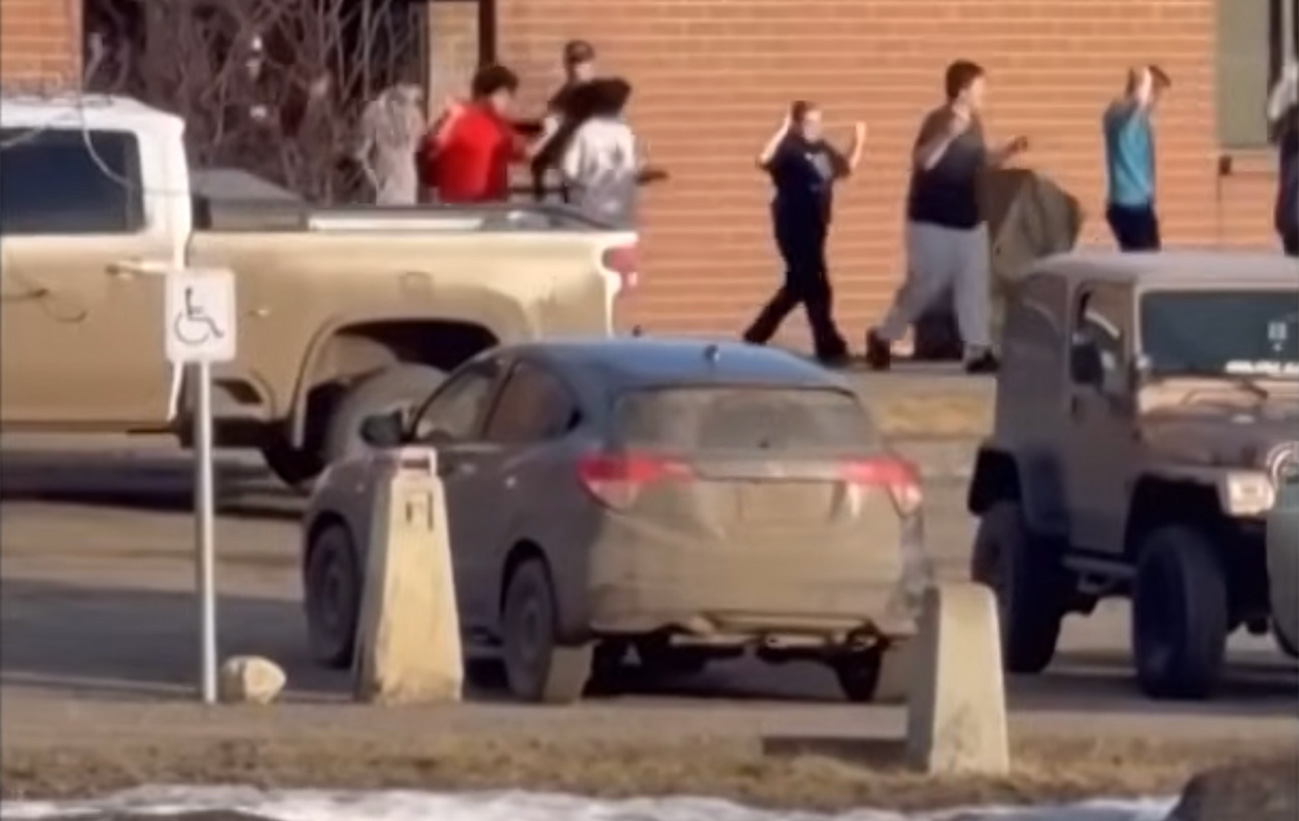
Canadian authorities on Wednesday said the person who killed seven people and injured more than two dozen others at a school in Tumbler Ridge, British Columbia, the day before was transgender.
Dwayne McDonald, the deputy commissioner for the Royal Canadian Mounted Police in British Columbia, during a press conference said Jesse Van Rootselaar, 18, “was born as a biological male who approximately … six years ago began to transition as female and identified as female both socially and publicly.” McDonald added it is “too early to say whether” the shooter’s gender identity “has any correlation in this investigation.”
The shooter died by suicide, and authorities found her body inside the school.
“We have a history of police attendance at the family residence,” said McDonald. “Some of those calls were related to mental health issues.”
Egale Canada, the country’s LGBTQ and intersex rights group, on Wednesday said it is “heartbroken by the horrific shooting in Tumbler Ridge.”
“Our deepest condolences are with the victims, their families, and the entire community as they navigate unimaginable grief,” said the group in a statement. “We unequivocally condemn this act of violence. There is no place for violence in our schools or in our communities. At this profoundly difficult time, we hold the people of Tumbler Ridge in our thoughts and stand in solidarity with all those affected.”
Mass shootings are relatively rare in Canada, unlike in the U.S.
GLAAD notes statistics from the Gun Violence Archive that indicate trans people carried out less than 0.1 percent of the 5,748 mass shootings in the U.S. between Jan. 1, 2013, and Sept. 15, 2025. The Human Rights Campaign, the National LGBTQ Task Force, and other advocacy groups last August condemned efforts to scapegoat the community after a trans woman shot and killed two children and injured 17 others inside the Annunciation Catholic School in Minneapolis.





